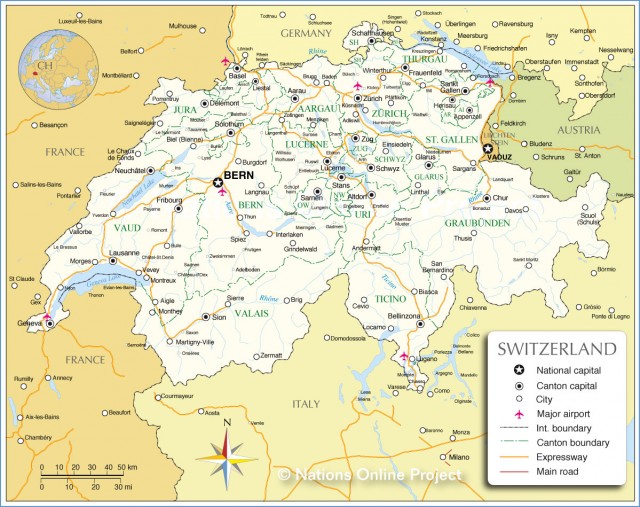Switzerland
Area 15,942 square mi (41,290 square km)
Population 8.190 million 2014
Capital Bern
Highest Point 15,153 ft (4,634 m)
Lowest Point 637 ft (195 m)
GDP $701.0 billion 2014
Primary Natural Resources hydropower, timber, salt.
THE SWISS CONFEDERATION is a LANDLOCKED country that borders FRANCE to the west, GERMANY to the north, LIECHTENSTEIN and AUSTRIA to the east, and ITALY to the south and southeast. Switzerland is a federal republic that is divided into 26 cantons. It has a bicameral federal assembly, which consists of the council of states and the national council. The president serves as the head of state and government and is elected for a one-year term. Switzerland's major cities are Bern, Zurich, Basel, Lausanne, and Geneva.

Switzerland is a mountainous country with the Jura Mountains to the north and the Swiss ALPS to the south and south east. The central plateau lies between the Jura and the Alps, where two-thirds of the population live. The Alps are the source of two major European rivers, the RHINE and the RHONE. Switzerland's other major rivers are the Ticino, the Aare, and the Inn. The Alps play a significant role in Switzerland's climate.
The mean temperature at the central plateau is 50 degrees F (10 degrees C) and decreases by 3 degrees F (1.7 degree C) for every 1,000 ft (305 m) in elevation. The climate, however, in the southern slopes of the Alps is Mediterranean, which receives warm breezes from Italy.
Among the earliest peoples to inhabit what is now Switzerland were the Helvetii in the west and the Rhaetians in the east. By the 1st century B.C.E., the Romans had conquered the region and named it Helvetia. In the 4th century C.E., Helvetia was overrun by the Germanic invasions that swept through the Roman Empire and was settled by the Burgundians and the Alamanni. By the 6th century, the Franks conquered both the Burgundians and Alamanni and brought Christianity to the region and subsequently became part of the Carolingian empire by the 9th century. By the 11th century, Switzerland became part of the Holy Roman Empire.
The beginning of the Swiss Confederation dates to 1291, when the cantons of Schwyz, Uri, and Unterwalden rebelled against Habsburg domination and formed a defense alliance. The three cantons defeated Habsburg forces in the battles of Morgarten, Nafels, Sempach, and Dornach. During the 14th century, the alliance grew to include Luzern, Zurich, Glarus, Zug, and Bern, which formed the core of the Swiss Confederation.
Switzerland was swept in the turmoil of the Protestant Reformation, as the confederation was divided into Catholic and Protestant cantons. Geneva, under John Calvin, became a leading center of Protestantism. Switzerland remained neutral during the Thirty Years' War, and its independence was recognized in the Treaty of Westphalia in 1648.
In 1798, Switzerland fell under the sway of Napoleon's armies and was reorganized into the Helvetic Republic, which replaced the loosely controlled confederation into a republic with a central government. By 1803, after the cantons had rebelled against the government imposed by the French, the former confederation was restored. At the end of the Napoleonic Wars, Switzerland's perpetual neutrality was respected at the Congress of Vienna in 1815, and the Federal Treaty of the same year confirmed the sovereign nature of the cantons.
The experience during the French Revolution spurred the movements for political reform and centralization, which were opposed by conservative cantons of Uri, Schwyz, Unterwalden, Zug, Basel, and Neuchatel. On December 11, 1845, in response to the closing of some monasteries by the canton of Aargau on the basis of inciting the population, the Catholic cantons of Uri, Schwyz, Unterwalden, Lucerne, Zug, Fribug, and Valais formed a defensive alliance called the Sonderbund, which was forbidden by the Federal Treaty of 1815. In 1847, the Diet voted for the dissolution of the Sonderbund, expulsion of the Jesuits, and the revision of the constitution. A conflict resulted between the forces of the Diet and the Sonderbund, which lasted for 20 days and resulted in 100 casualties. The Sonderbund surrendered, and work began on the reorganization of the Swiss government. On September 12, 1848, a new constitution was proclaimed, which was based on the model of the American constitution.
During the 20th century, Switzerland remained neutral during both world wars, yet because of its neutrality, Switzerland became the site of international agencies such as the International Red Cross, international conferences, and various United Nations organizations. However, the question of Swiss neutrality arose in declassified documents detailing the role of Swiss banks in laundering Nazi gold taken from Holocaust victims and for withholding funds held by Holocaust victims. During the postwar period, Switzerland joined various international organizations that did not compromise its neutrality, such as the Organization for European Economic Cooperation, the European Free Trade Association, and the Council of Europe. In 1971, women were given the right to vote in federal elections. In 1989, 64 percent of the voters rejected a proposal to abolish the armed forces. In 1999, Switzerland opted not to join the European Monetary Union. In 2002, Switzerland became a member of the United Nations.
Switzerland has a diverse population of Germans, French, Italian, and Romansch, whose languages also serve as the official languages. The Swiss pride themselves in their diversity while preserving national unity in a world full of ethnic strife. However, in recent years, the question of nationality has arisen amid the rise of populist right-wing extremists.
Switzerland ranks among the world's leading industrial economies. Its banking system has been known for its strict client confidentiality, making it a haven for questionable investors. However, in the face of threatened sanctions by the UNITED STATES and other countries, there have been changes in banking practices. In its gross domestic product, services account for 64 percent, industry at 34 percent, and agriculture at 2 percent. The question facing the Swiss people is whether to share their lot with the European Union.